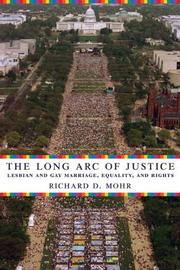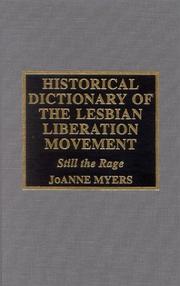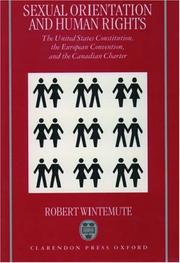| Listing 1 - 10 of 18 | << page >> |
Sort by
|
Book
ISBN: 2802718029 9601509682 9782802718024 Year: 2003 Publisher: Athens Ant. N. Sakkoulas
Abstract | Keywords | Export | Availability | Bookmark
 Loading...
Loading...Choose an application
- Reference Manager
- EndNote
- RefWorks (Direct export to RefWorks)
Homophobia --- Gay rights --- Gays --- Homophobie --- Homosexuels --- Violence envers les homosexuels --- Violence against --- Droits --- Homophobia. --- Violence. --- Gay rights. --- Hate crimes. --- Crimes against. --- Law --- Sociology of minorities --- Sociology of the family. Sociology of sexuality --- Human rights --- Gays - Crimes against. --- DROIT INTERNATIONAL PUBLIC --- DISCRIMINATION A CARACTERE SEXUEL --- PROTECTION DE L'INDIVIDU --- Homosexuality --- Romantic and sexual orientation --- Legislation --- Book --- Discrimination --- Gay people --- Violence against.
Book
ISBN: 9781487501686 1487501684 9781487513757 9781487513740 Year: 2020 Publisher: Toronto, Ont. University of Toronto Press
Abstract | Keywords | Export | Availability | Bookmark
 Loading...
Loading...Choose an application
- Reference Manager
- EndNote
- RefWorks (Direct export to RefWorks)
"Superfluous Women tells the unique story of a generation of artists, feminists, and queer activists who emerged in Ukraine after the collapse of the Soviet Union. With a focus on new media, Zychowicz demonstrates how contemporary artist collectives in Ukraine have contested Soviet and Western connotations of feminism to draw attention to a range of human rights issues with global impact. In the book, Zychowicz summarizes and engages with more recent critical scholarship on the role of digital media and virtual environments in concepts of the public sphere. Mapping out several key changes in newly independent Ukraine, she traces the discursive links between distinct eras, marked by mass gatherings on Kyiv's main square, in order to investigate the deeper shifts driving feminist protest and politics today."--
Art, Ukrainian --- Feminism and art --- Art --- Feminism --- Women's rights --- Gay rights --- Art, Ukrainian. --- Feminism. --- Feminism and art. --- Gay rights. --- Women's rights. --- Political aspects --- History --- Political aspects. --- 2000-2099 --- Ukraine. --- Pussy Riot [Moscow] --- Femen --- anno 2000-2099 --- Ukraine --- Photography --- Revolutions --- Book

ISBN: 0472112236 9780472022748 0472022741 Year: 2002 Publisher: Ann Arbor The University of Michigan Press
Abstract | Keywords | Export | Availability | Bookmark
 Loading...
Loading...Choose an application
- Reference Manager
- EndNote
- RefWorks (Direct export to RefWorks)
Gay rights --- Same-sex marriage --- Law and legislation --- Law --- Sociology of the family. Sociology of sexuality --- United States --- Hawaii --- Politics and government --- Social policy --- United States of America --- Gay marriages --- Homosexuality --- Lesbian relationships --- Attitudes --- Legislation --- Book --- Hawaii [state]

ISBN: 0231135203 0231135211 0231509448 9780231509442 9780231135207 Year: 2005 Publisher: New York Columbia University Press
Abstract | Keywords | Export | Availability | Bookmark
 Loading...
Loading...Choose an application
- Reference Manager
- EndNote
- RefWorks (Direct export to RefWorks)
Engaging the whole spectrum of public-policy issues affecting gays and lesbians from a humanistic and philosophical approach, Richard Mohr uses the tools of his trade to assess the logic and ethics of gay rights. Focusing on ideas and values, Mohr's nuanced case for legal and social acceptance applies widely held ethical principles to various issues, including same-sex marriage, AIDS, and gays in the military. By drawing on cultural-, legal-, and ethical-based arguments, Mohr moves away from tired political rhetoric and reveals the important ways in which the struggle for gay rights and acceptance relates to mainstream American society, history, and political life. Mohr forcefully counters moralistic and religious arguments regularly invoked to keep gay men and women from achieving the same rights as heterosexuals. He examines the nature of prejudices and other cultural forces that work against lesbian and gay causes and considers the role that sexuality plays in the national rituals by which Americans define themselves. In his support of same-sex marriage, Mohr defines matrimony as the development and maintenance of intimacy through the means by which people meet their basic needs and carry out their everyday living. Mohr contends that this definition, in both its legal and moral sense, applies equally to homosexual and heterosexual couples. Mohr also considers gays and lesbians as community members as he explores the prospect for greater legal and social inclusion. He concludes by suggesting that recent progress in addressing civil rights for gays and lesbians and the nation's symbolic use of gay issues on both sides of the political spectrum calls for a culturally focused gay politics.
Gay rights --- Gays --- Same-sex marriage --- Law --- Sexology --- Polemology --- Social policy --- Sociology of the family. Sociology of sexuality --- United States --- United States of America --- Equal opportunities --- Gay marriages --- Homosexuality --- Army --- Female homosexuality --- Lesbian relationships --- Stereotypes --- Legislation --- Book --- Gay people

ISBN: 0810845067 Year: 2003 Volume: 45 Publisher: Lanham The Scarecrow Press
Abstract | Keywords | Export | Availability | Bookmark
 Loading...
Loading...Choose an application
- Reference Manager
- EndNote
- RefWorks (Direct export to RefWorks)
Een geschiedenis van vooral de Amerikaanse lesbische beweging in de vorm van een woordenboekgegoten. Aan de hand van trefwoorden worden korte beschrijvingen gegeven. Het boek biedt zowelbasisinformatie, als details van de lesbische beweging. Vooraan is een uitgebreide tijdslijn opgenomen vanmarkante gebeurtenissen voor lesbische vrouwen.
History --- Sociology of culture --- Community organization --- Sociology of the family. Sociology of sexuality --- Gay liberation movement --- Encyclopedias --- Gay rights --- Lesbians --- Social conditions --- United States --- LGBTQIA culture --- Homosexuality --- International --- Lesbian movements --- Book
Book
ISBN: 9780745698687 9780745698694 0745698697 0745698689 Year: 2016 Publisher: Cambridge Polity
Abstract | Keywords | Export | Availability | Bookmark
 Loading...
Loading...Choose an application
- Reference Manager
- EndNote
- RefWorks (Direct export to RefWorks)
"The claim that 'LGBT rights are human rights' encounters fierce opposition in many parts of the world, as governments and religious leaders have used resistance to 'LGBT rights' to cast themselves as defenders of traditional values against neo-colonial interference and western decadence.Queer Wars explores the growing international polarization over sexual rights, and the creative responses from social movements and activists, some of whom face murder, imprisonment or rape because of their perceived sexuality or gender expression.This book asks why sexuality and gender identity have become so vexed an issue between and within nations, and how we can best advocate for change." --
Human rights --- Sociology of the family. Sociology of sexuality --- Gay rights. --- Gays --- Human rights. --- Political activity. --- Sociologie van het gezin. Sociologie van de seksualiteit --- Fundamentele rechten en vrijheden --- Homophobia. --- Prejudices. --- Gay movements --- Homosexuality --- Attitudes --- Book --- Gay people
Book
ISBN: 9781478018889 Year: 2022 Publisher: Durham Duke University Press
Abstract | Keywords | Export | Availability | Bookmark
 Loading...
Loading...Choose an application
- Reference Manager
- EndNote
- RefWorks (Direct export to RefWorks)
"Changing the Subject maps a rapidly transforming terrain of gender and sexual rights under conditions of global neoliberalism in India. Srila Roy shows how feminism is itself a form of power, a site of subject-making in its own right. Against concerns about the cooptation of feminism by neoliberalism, Roy provides a detailed ethnographic account of feminism's entanglement in technologies of power and the self. Roy traces the very different trajectories of two Calcutta-based feminist NGOs: Sappho for Equality (SFE), a grassroots queer feminist organization that shifted from a consciousness-raising group to a fully funded NGO by the time of Roy's fieldwork; and Janam, which emerged in the 1990s as a more clearly neoliberal organization focusing on empowerment and development technologies including microfinance. Despite their differences, Roy shows how both SFE and Janam are tied together with India's neoliberal economic restructuring. Further, she explores the ways contemporary "milliennial feminisms" and (queer) feminist activism-NGO-based or otherwise-are haunted by older modes of governing subaltern subjects in the Global South"--
Neoliberalism --- Queer --- Policy --- Book --- Non-governmental organizations --- Activism --- India --- Feminism --- Gay rights --- HISTORY / Asia / South / General. --- Queer theory. --- SOCIAL SCIENCE / Women's Studies. --- Women in development --- Women --- Economic conditions
Book
ISBN: 9780190865511 9780190865528 9780190865542 9780190865559 Year: 2020 Publisher: New York, N.Y. Oxford University Press
Abstract | Keywords | Export | Availability | Bookmark
 Loading...
Loading...Choose an application
- Reference Manager
- EndNote
- RefWorks (Direct export to RefWorks)
Between 2009 and 2014, an anti-homosexuality law circulating in the Ugandan parliament attracted global attention for the draconian nature of its provisions and for the involvement of US anti-gay evangelical Christians who were reported to have lobbied for its passage. This book makes three contributions to our understanding of these developments. First, it offers an account of the international relations that anticipated and followed the Anti Homosexuality Act. Journeying through encounters between the kingdom of Buganda and British colonialism, between the Ugandan state and its international donors, and between LGBTI activists in the global South and North, the book illuminates the frictional collaborations across geopolitical divides that produce and contest contemporary queerphobias. Second, it explores the dialectic produced by two opposed statements that mark queer postcolonial disagreements—‘homosexuality is Western’ and ‘homophobia is Western’. Arguing that both statements are plausible but evasive, the book demonstrates how their opposition produces distinctive forms of temporal politics in the queer postcolony. In this register, the book explores the afterlives of colonialism and the queer futures enabled by it in Uganda, India, and Britain. Third, in shifting the scenes of encounter that it investigates from one chapter to the next, the book reveals how queerness mutates in different configurations of power to become a metonym for other categories such as nationality, religiosity, race, class, and caste. It argues that these mutations reveal the grammars forged in the originary violence of the state and social institutions in which queer difference struggles to find place.
Sociology of the family. Sociology of sexuality --- Colonisation. Decolonisation --- British colonies. --- Gay rights --- Gay rights. --- Gays --- Homophobia --- Homophobia. --- Homophobie --- Homosexuality --- Homosexuels --- Postcolonialism. --- Postkolonialismus. --- Queer-Theorie. --- Social conditions. --- Social conditions --- Law and legislation --- Law and legislation. --- Conditions sociales --- Droits --- 2000-2099. --- Great Britain --- India. --- Uganda. --- Colonies --- United Kingdom --- India --- Uganda --- Gay and lesbian rights --- Gay men --- Lesbian rights --- Lesbians --- Rights of gays --- Rights of lesbians --- Civil rights --- Legal status, laws, etc. --- Queer --- Capitalism --- Government policy --- Politics --- Book

ISBN: 0198264887 0198259727 9780198264880 Year: 1997 Publisher: Oxford Clarendon
Abstract | Keywords | Export | Availability | Bookmark
 Loading...
Loading...Choose an application
- Reference Manager
- EndNote
- RefWorks (Direct export to RefWorks)
Human rights --- Gay rights. --- Gay rights --- Homoseksuelen--Rechten --- Homosexuels [Droits des ] --- Orientation sexuelle --- Seksuele geaardheid --- Seksuele voorkeur --- Homosexuels --- Law --- Sexology --- Sociology of minorities --- Sociology of the family. Sociology of sexuality --- Canada --- United States --- Europe --- Gays --- Homosexuality --- Legal status, laws, etc. --- Law and legislation. --- Sexual orientation --- Droits de l'homme (Droit international) --- Legal status, laws, etc --- Droits --- Droit --- Gays - Legal status, laws, etc. --- Homosexuality - Law and legislation. --- Human rights - United States. --- Human rights - Canada. --- Human rights - Europe. --- United States of America --- Legislation --- Book --- Discrimination --- Gay people
Book
ISBN: 2800413670 9782800413679 Year: 2006 Publisher: Bruxelles Université de Bruxelles
Abstract | Keywords | Export | Availability | Bookmark
 Loading...
Loading...Choose an application
- Reference Manager
- EndNote
- RefWorks (Direct export to RefWorks)
Fonds Suzan Daniel (FSD)
Gay rights --- Homosexuels --- Status of persons --- Human rights --- European Union --- France --- Montenegro --- Poland --- Sweden --- Greece --- Hungary --- Belgium --- Slovenia --- Romania --- Gays --- Gay people --- Gay persons --- Homosexuals --- Sexual minorities --- Gay and lesbian rights --- Gay men --- Lesbian rights --- Lesbians --- Rights of gays --- Rights of lesbians --- Civil rights --- Legal status, laws, etc --- Legal status, laws, etc. --- Congresses --- Droits --- Congrès --- Persons --- Gay rights - European Union countries - Congresses. --- Gays - Legal status, laws, etc. - European Union countries - Congresses. --- Droit public comparé --- Discrimination fondée sur l'orientation sexuelle --- HOMOSEXUALITE --- Droits et libertés --- Egalité de traitement --- Non-discrimination --- DISCRIMINATION --- Family law --- Homophobia --- Gay marriages --- Homosexuality --- International conventions --- Anti-discrimination laws --- Labour --- Legislation --- Book --- Congresses.
| Listing 1 - 10 of 18 | << page >> |
Sort by
|

 Search
Search Feedback
Feedback About UniCat
About UniCat  Help
Help News
News